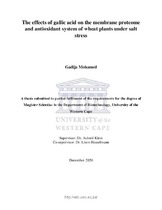| dc.contributor.advisor | Klein, Ashwil | |
| dc.contributor.author | Mohamed, Gadija | |
| dc.date.accessioned | 2021-04-30T09:02:26Z | |
| dc.date.available | 2022-01-01T22:10:06Z | |
| dc.date.issued | 2020 | |
| dc.identifier.uri | http://hdl.handle.net/11394/8252 | |
| dc.description | >Magister Scientiae - MSc | en_US |
| dc.description.abstract | Salt stress is a major abiotic stress that accounts for huge agricultural losses worldwide, which in turn threaten food security and sustainable agriculture. Salt triggers the excessive production of reactive oxygen species (ROS) which accumulate to levels that become toxic to plants, resulting in cell death and reduced plant growth. Part of the plant’s mechanisms to counteract ROS-induced cell death involves the scavenging ability of the antioxidant defense system to maintain redox homeostasis. Gallic acid (GA) is an antioxidant that has been shown to reduce salt-induced ROS in legume plants. However, its effects on wheat plants have not been elucidated. This study thus investigated the role of exogenous GA (250 μM) on the physiological responses and antioxidant system of wheat plants under salt stress (150 mM). In addition, this study also investigated how GA and salt stress influenced changes in the membrane proteome of wheat plants using LC-MS proteomic analysis. | en_US |
| dc.language.iso | en | en_US |
| dc.publisher | University of Western Cape | en_US |
| dc.subject | Antioxidant enzymes | en_US |
| dc.subject | Gallic acid (GA) | en_US |
| dc.subject | Lipid peroxidation | en_US |
| dc.subject | Photosynthesis | en_US |
| dc.subject | Protein identification | en_US |
| dc.subject | Protein synthesis | en_US |
| dc.title | The effects of gallic acid on the membrane proteome and antioxidant system of wheat plants under salt stress | en_US |
| dc.rights.holder | University of Western Cape | en_US |

